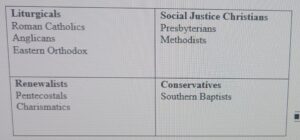(Taken from the book of this title by Phyllis Tickle)
The Great Reformation of 500 years ago “was about the change, politically, in Western governance from fiefdoms, baronies, and hereditary domains to the nation-state configuration that for most of the last five centuries has informed the Western way of ordering life”
“The Great Reformation, economically, was about…birthing, and then enabling capitalism as a dominant characteristic of Western ways…The Great Reformation was also about a world that, in order to communicate its new ways and profit from them, abruptly needed a literate population for commercial reasons.”
“The Great Reformation was also concerned with the discoveries being made in the physical universe and, as a result, of human ability to begin to pierce, penetrate, understand, manipulate, and even in some ways change or harness the power for the betterment of mankind”
“The Great Reformation was about a whole shopping list of things, every one of them part and parcel of who we are and what our society for the last five centuries has been.”
And “religion, whether we like it or not, is intimately tied to the culture in which it exists… Just as surely as one of the functions of religion is to inform, counsel, and temper the society in which it exists, just so surely is every religion informed and colored by its hosting society”
Now we are in another time of transition, one that is having as great an effect on society and religion as the Great Reformation. It is known as the Great Emergence. And the Christianity that is now emerging is quite different that which emerged from the Great Reformation.
According to a recent Barna survey these are the five top responses to the question of why people are beginning to doubt Christian beliefs and, as a result, leaving Christian churches and becoming self-styled spiritual, but not religious people.
• The hypocrisy of religious people (42%)
• Science (31%)
• Human suffering (30%)
• One religion can’t have all the answers (29%)
• Conflict in the world (24%)
In other words, people are abandoning organized religion as it exists today because they do not see that it understands scientific realities, is unwilling to examine other possibilities than its preconceived opinions and is failing to address human suffering in the form of racism, poverty and outright intolerance of people that are not like themselves, often resulting in physical conflict.
This is obviously a far cry from what God birthed the church to be, a loving, caring, accepting body of people who invited one and all to join them, and who took measures to ensure that everyone’s needs were met. So God is once again stirring the waters of human society and religion to flush out the detrimental aspects of both and to usher in a new era of human relations that more closely resembles the kingdom of God on Earth.
As Phyllis Tickle pointed out in “The Great Emergence” in the five hundred or so years since the Great Reformation North American Christianity has evolved into four, roughly equal groups or categories to form a diagram called a quadrilateral.
What is happening as God stirs the waters is a blurring of lines between the four sectors, with the result being a gathering center. Where there were once very distinct segments of Christianity whose leaders seldom spoke to one another, much less tried to understand the other’s point of view, the advent of the world wide web and the burgeoning social media exposed the people in the pews to a great variety of differing opinions and they began to wonder if they still had all of the answers to the burning issues arising in the society in which they lived.
In the center of the quadrilateral, “where the four corners of the segments had met, now there was s swirling center , its centripetal force racing from quadrant to quadrant in ever-widening circles, picking up ideas and people from each, sweeping the into the center, mixing them there, and then spewing them forth into a new way of being Christian, a new way of being Church”
So what are the basic characteristics of Emergence Christianity?
- Radical obedience to the words and teaching of Jesus Christ as recorded in Scripture and as received, during discernment, prayer, and teachings, into their own beingness
- Insistence that the Bible tells one story in the Old and New Testaments, so there is a respectful connection between Judaism and Christianity
- Willing susceptibility to the power and truth of story, but suspicion of propositional truth and especially of doctrinal and/or dogmatic exegesis.
- Belief that theology as a conversation is something to be used as a means, not an end.
- To always opt for grace over morality
- To be entirely persuaded that orthopraxy, or right action, trumps orthodoxy, or right belief, every time
- To know above and beyond all else, that the Bible story tells us that there is a kingdom, that it is now and not yet, here and also there, come and coming and then, knowing this, to live every minute of every day accordingly
